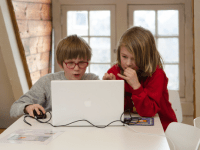Coding for Kids Revisited
Learn about six new or improved resources designed especially to help elementary school students learn and develop coding skills.
While it feels like we just wrote 7 Apps for Teaching Children Coding Skills, it's been a year, and as we know, that’s a couple of lifetimes in the technology world! Over the past year, we've discovered even more fabulous sites for teaching coding.
With programs like the Hour of Code and other sites, it looks like many children have been exposed to computer programming, but we feel that we still have a long way to go. Graduates with programming skills are in high demand, and it's clear those numbers will only increase. In addition, the skills acquired through programming, like logical thinking, problem solving, persistence, collaboration, and communication, can be applied to any grade level, any subject area, and in every part of life. Programming isn't just limited to computer science majors in college. Like we said a year ago, kids can code -- we have the sites and resources to make it happen. And it's never been more important to provide students with opportunities to be exposed to programming, especially girls and minorities. In the interest of space, we've limited our list to resources for coding with elementary students (ages 5-11), and best of all, free resources!
Hopscotch
Platform: iPad
Cost: free
Hopscotch is still a favorite for us. We talked about this last time, but it's still free, and they've added so many new features for both building and sharing that we can't imagine it not being at the top of our list. The block coding makes it easy for early readers to program, but the complexity keeps it engaging and challenging for older students, too. Users can create games, stories, interactive art, apps, and more!
ScratchJr
Platform: iPad
Cost: free
Scratch remains a free go-to online app, and now there's ScratchJr! ScratchJr is a free iPad app that brings coding to students as young as age five. Like Hopscotch and Scratch, this uses block coding, but instead of words, the blocks have icons. The blocks snap together to create a program, allowing students to build their own stories and games. Though the program uses images instead of words, it still has some complexity with loops. We feel that, rather than letting kids start with exploration, direct teaching would be the best way to start with this program.
Kodable
Platform: iPad
Cost: free with premium services
One app that we wish had made the cut for our original list was Kodable. (Unfortunately, we discovered it almost immediately after the article posted.) Kodable is another picture-block coding app for the iPad, but this one teaches programming more directly. Students are presented with a series of puzzles increasing in difficulty and complexity, and they have to use the programming blocks to navigate their little fuzzy monster. Kodable differs from the previous apps in that students don't create things, but rather program to solve puzzles. The app has both a free and a premium version, comes with learning guides for teachers and parents, and should be considered a great way to introduce the concepts of programming.
Run Marco
Platform: iPad, Android, Kindle Fire, web
Cost: free
We just learned about Run Marco this week, and while we haven't had much time to dig deep, we like what we've seen so far. Marketed as an "adventurous coding game," it's something that students can play on an iPad, Android, Kindle Fire, or online. This is similar to Kodable in that players learn coding by advancing through a game, and there doesn't seem to be a way of creating your own code from scratch. The blocks, however, have words as well as pictures. While the words are more prominent, the pictures are obvious enough and should be easy for pre-readers. At the time of this writing, only the first ten levels are available, with more to come soon.
Code Studio
Platform: web
Cost: free
We're very excited to share more resources specific to elementary teachers from Code.org! The site now features Code Studio, a K-5 curriculum that has both unplugged and digital resources for teaching coding. There are three courses, with about 20 lessons per course. The courses use block programming that looks similar to Scratch, but students will see familiar characters from games such as Angry Birds and Plants vs. Zombies. Teachers can sign up for a free account that allows them to track student progress and access lesson plans and resources. You might even find free face-to-face professional development in your area! And although labeled for K-5, the second and third courses could be used with middle school students who have not been exposed to coding.
CS-First
Platform: web
Cost: free
Finally, we want to mention CS-First. This computer science program is sponsored by Google and offers free materials for helping students learn to code using Scratch in a fun, supportive club atmosphere. The materials are often used by students age 9-15 and provide everything needed for learning to code, so no computer science background is necessary for the instructor. There are currently four themes: Game Design, Storytelling, Fashion & Design, and Music & Sound. The program can be implemented as an after-school club or integrated into instruction -- and did we mention that it's high quality and free?
We hope that you'll try out some of these resources and, if you haven't already, that you'll seriously consider incorporating coding into your curriculum. Not only can you align lessons to your standards, but this is also a great way for teaching problem solving and critical thinking, and for sparking creativity. Best of all, teachers don't need a coding background. All of these tools provide tutorials and instructions so that anyone can do it. Let’s get coding!
